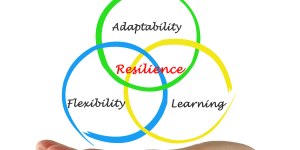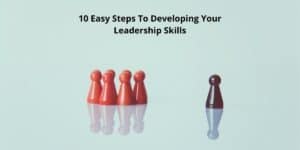In today’s fast-paced and competitive business world, leadership skills have become a critical factor in determining an organization’s success or failure. While traditional leadership qualities like intelligence, knowledge, and experience are essential, there is another crucial factor that sets great leaders apart from the average ones – Emotional Intelligence (EI).
Leaders with high EI possess a unique set of skills that help them navigate complex situations, manage teams effectively, and build strong relationships with stakeholders. In fact, studies have shown that leaders with high emotional intelligence outperform their peers in almost every aspect of their work. So, what is emotional intelligence, and why is it so vital for leadership success? In this article, we will explore the concept of emotional intelligence, its key components, and how it can help leaders achieve greater success in their roles.

What is Emotional Intelligence and why is it important?
Emotional Intelligence (EI) is the ability to recognize, understand, and manage our own emotions and the emotions of others. It is often described as the capacity to be aware of, control, and express one’s emotions, and to handle interpersonal relationships judiciously and empathetically. EI is particularly important in leadership roles, where the ability to manage a diverse team of individuals and effectively communicate with others is crucial.
In the business world, it is not enough for leaders to be intelligent, knowledgeable, and experienced. They must also possess strong emotional intelligence skills to navigate complex situations, manage teams effectively, and build strong relationships with stakeholders. As the workplace becomes more diverse and global, the importance of emotional intelligence has never been higher. In fact, research has shown that emotional intelligence is a better predictor of success in the workplace than IQ, and it accounts for up to 90% of the difference between outstanding and average leaders.
Understanding the importance of emotional intelligence in leadership is a crucial step in creating a productive and engaged workforce. By recognizing the value of emotionally intelligent leaders, organizations can better attract, develop, and retain top talent, while also increasing employee satisfaction, collaboration, and innovation. The bottom line is that leaders with high emotional intelligence are more effective at inspiring and motivating their teams, making better decisions, and achieving organizational goals.
The Science Behind Emotional Intelligence
The concept of emotional intelligence was first introduced in the 1960s by psychologists Peter Salovey and John Mayer, who defined it as “the ability to monitor one’s own and other’s feelings and emotions, to discriminate among them and to use this information to guide one’s thinking and actions.” The idea gained widespread attention in the 1990s, thanks to the work of psychologist and author Daniel Goleman, who popularized the concept in his best-selling book, “Emotional Intelligence: Why It Can Matter More Than IQ.”
Goleman’s research revealed that emotional intelligence is made up of five key components: self-awareness, self-regulation, motivation, empathy, and social skills. Each of these components plays a critical role in the overall effectiveness of a leader, and together, they form the foundation of EI.
Neuroscience has also contributed to our understanding of emotional intelligence. Studies have shown that different areas of the brain are responsible for processing emotions, and that these areas are interconnected with regions responsible for cognitive functions like decision-making and problem-solving. This research has helped to establish a biological basis for the concept of EI and has contributed to the growing recognition that emotions play a critical role in leadership and organizational success.
Characteristics of Leaders with High Emotional Intelligence
Leaders with high emotional intelligence possess a unique set of characteristics that set them apart from their peers. These traits not only enable them to manage their own emotions effectively, but also allow them to better understand and respond to the emotions of others. Some of the key characteristics of emotionally intelligent leaders include:
- Self-awareness: Emotionally intelligent leaders are aware of their own emotions and how they impact their thoughts, decisions, and actions. They can accurately assess their strengths and weaknesses and have a deep understanding of how their emotions affect their performance. This self-awareness enables them to make better decisions and to adapt their behaviour in response to different situations.
- Self-regulation: Leaders with high EI can regulate their emotions, which allows them to remain calm and composed even in challenging situations. They can manage their emotions effectively, preventing negative emotions from clouding their judgment or influencing their decisions. This emotional control helps them to maintain a positive and supportive atmosphere within their team, fostering collaboration and a healthy work environment.
- Motivation: Emotionally intelligent leaders are highly motivated and driven by a deep sense of purpose and passion for their work. They set ambitious goals for themselves and their teams, and they are committed to achieving these goals, even in the face of obstacles or setbacks. Their enthusiasm and determination inspire others to follow their lead and to strive for excellence.
- Empathy: Leaders with high emotional intelligence have a strong ability to empathize with others, which enables them to understand the feelings, thoughts, and perspectives of their team members. This empathy allows them to build strong relationships with their team, and to create an environment of trust, support, and open communication. Empathetic leaders are better able to identify the needs of their team and provide the resources and support necessary for success.
- Social skills: Emotionally intelligent leaders possess strong social skills, which enable them to communicate effectively, manage conflict, and build positive relationships with others. They are skilled at navigating complex interpersonal dynamics and can influence and inspire others to achieve their goals. These social skills are critical for building strong teams and fostering collaboration and innovation within an organization.
Benefits of High Emotional Intelligence in the Workplace
Leaders with high emotional intelligence bring numerous benefits to the workplace, not only for themselves but also for their teams and organizations. Some of the key advantages of high EI in the workplace include:
- Improved team performance: Emotionally intelligent leaders are more effective at motivating and engaging their teams, which leads to higher levels of productivity, creativity, and innovation. They create an environment in which team members feel valued, supported, and empowered, fostering collaboration and a strong sense of team identity.
- Better decision-making: High EI enables leaders to make more informed and rational decisions, as they are better able to recognize and manage the emotional factors that can influence their judgment. They are also more likely to seek input from their team and to consider multiple perspectives before making a decision, leading to more effective and well-rounded solutions.
- Increased employee satisfaction: Employees who work under emotionally intelligent leaders report higher levels of job satisfaction, as they feel more valued and supported in their roles. This increased satisfaction leads to greater employee engagement and loyalty, which in turn contributes to lower turnover rates and higher levels of organizational commitment.
- Stronger relationships: Emotionally intelligent leaders are skilled at building and maintaining strong relationships with their team members, peers, and stakeholders. They are adept at navigating complex interpersonal dynamics, managing conflict, and fostering open and honest communication. These strong relationships are essential for effective collaboration, problem-solving, and organizational success.
- Resilience: Leaders with high emotional intelligence are better equipped to cope with stress, adversity, and change. They are more resilient and can adapt more easily to new challenges or setbacks, which is particularly valuable in today’s fast-paced and constantly evolving business environment.
Emotional Intelligence vs. IQ
While both emotional intelligence and intelligence quotient (IQ) are important factors in determining an individual’s success in the workplace, it is important to recognize the distinct differences between the two. IQ refers to an individual’s cognitive abilities, such as problem-solving, logical reasoning, and analytical skills. In contrast, emotional intelligence focuses on an individual’s ability to recognize, understand, and manage emotions, both their own and those of others.
While a high IQ is undoubtedly an asset in the workplace, research has shown that it is not the sole determinant of success. Studies have demonstrated that emotional intelligence is a better predictor of workplace success than IQ. This is because emotionally intelligent leaders are better able to navigate complex interpersonal dynamics, inspire and motivate their teams, and make well-rounded decisions that consider both rational and emotional factors.
As the business world becomes increasingly complex and interconnected, the importance of emotional intelligence in leadership roles will continue to grow. Organizations that prioritize the development of emotionally intelligent leaders will be better equipped to adapt to change, foster innovation, and achieve long-term success.
Developing Emotional Intelligence
The good news is that emotional intelligence is not a fixed trait; it can be developed and improved over time through self-reflection, practice, and training. Individuals who wish to enhance their emotional intelligence can take several steps to do so:
- Cultivate self-awareness: Becoming more self-aware involves regularly reflecting on your emotions, thoughts, and behaviours, and recognizing how they impact your performance and relationships. This can be achieved through practices such as journaling, mindfulness meditation, or seeking feedback from others.
- Practice self-regulation: Developing the ability to manage your emotions effectively requires recognizing your emotional triggers and finding healthy ways to cope with them. This may involve techniques such as deep breathing, exercise, or engaging in activities that bring you joy and relaxation.
- Build empathy: Strengthening your empathy skills involves actively listening to others, putting yourself in their shoes, and validating their emotions. By practicing empathy, you will be better equipped to understand and respond to the emotions of those around you.
- Improve social skills: Enhancing your social skills involves actively working on your communication, conflict resolution, and relationship-building abilities. This can be achieved through training, practice, and seeking feedback from others.
- Seek professional development opportunities: Many organizations offer training programs and workshops focused on developing emotional intelligence. Participating in these opportunities can help individuals to build their EI skills and apply them to their leadership roles.
How to measure Emotional Intelligence
There are several tools and assessments available for measuring an individual’s emotional intelligence, including self-report questionnaires, 360-degree feedback assessments, and performance-based tests. Some of the most widely used EI assessments include the Emotional Quotient Inventory (EQ-i), the Mayer-Salovey-Caruso Emotional Intelligence Test (MSCEIT), and the Bar-On Emotional Quotient-360 (EQ-360). These assessments can provide valuable insights into an individual’s strengths and areas for improvement in the five key components of EI, and can serve as a starting point for personal and professional development.
It is important to note that while these assessments can provide valuable information, they should not be used as the sole determinant of an individual’s emotional intelligence. Emotional intelligence is a complex and multifaceted trait, and it is best assessed through a combination of self-reflection, feedback from others, and objective measurements.
Case Studies: Examples of Leaders with High Emotional Intelligence
Throughout history, there have been numerous examples of leaders who have demonstrated high levels of emotional intelligence. These leaders have used their EI skills to inspire and motivate their teams, navigate complex situations, and achieve outstanding results. Some notable examples include:
- Nelson Mandela: The former South African president was known for his exceptional empathy, ability to forgive, and capacity to unite a deeply divided nation. His emotional intelligence allowed him to understand the needs and emotions of others, fostering reconciliation and healing in his country.
- Oprah Winfrey: The media mogul and philanthropist has built a global empire on her ability to connect with others and make them feel seen, heard, and valued. Her emotional intelligence has played a critical role in her success, enabling her to build strong relationships and inspire millions around the world.
- Richard Branson: The founder of the Virgin Group is known for his innovative approach to business and his strong focus on employee satisfaction and engagement. His high emotional intelligence has enabled him to create a unique corporate culture that fosters creativity, collaboration, and loyalty.
These case studies serve as powerful examples of the potential impact that emotionally intelligent leaders can have on their teams, organizations, and societies.
Conclusion: Why Emotional Intelligence is Essential for Effective Leadership
In conclusion, emotional intelligence is an essential trait for effective leadership. It enables leaders to understand the feelings and needs of others, navigate complex situations, and build strong relationships with their teams. Furthermore, it can be developed over time through self-reflection and feedback from others. By understanding and leveraging the power of EI, leaders can create a positive impact on their organizations and the world around them.










